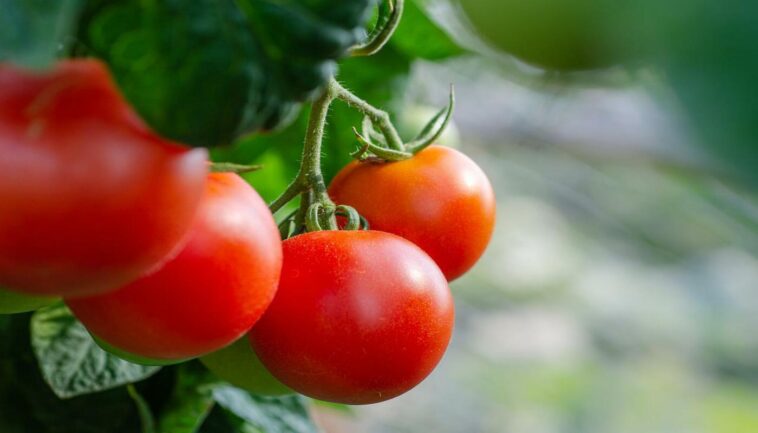as a responsible rabbit owner, I understand the importance of not just providing them with a loving home but also ensuring their dietary needs are met.
That’s why, today, we’re diving into a question that many rabbit parents have asked at some point: Can rabbits eat tomatoes?
Tomatoes are safe for rabbits in moderation, but the key lies in moderation. While the ripe flesh of a tomato is generally safe, the green parts (leaves stems, and unripe fruit) contain a substance called solanine, which can be toxic to rabbits. So, it’s crucial to feed them only the red, ripe part of the tomato, and avoid the green bits.
Another important point to remember is that tomatoes are relatively high in sugar. Feeding your rabbit too many tomatoes can upset their delicate digestive system and lead to obesity or gastrointestinal issues. As a responsible rabbit owner, it’s vital to offer tomatoes as an occasional treat, not a staple in their diet.
Safety Concerns Associated With Feeding Tomatoes to Rabbits
1. Tomato Leaves and Stems are Toxic
First and foremost, we need to recognize that while the ripe, red fruit of the tomato is generally considered safe for rabbits in moderation, the green parts of the plant, including the leaves and stems, are toxic.
These green parts contain a substance called solanine, which can be harmful to rabbits if ingested. So, when offering tomatoes to your bunny, make sure it’s only the ripe fruit, and never the green parts.
2. High Sugar Content
Tomatoes, although not toxic, have a relatively high sugar content for a rabbit’s diet. Excessive sugar intake can lead to various health issues, including obesity and digestive problems.
Therefore, it’s crucial to offer tomatoes as an occasional treat and not a dietary staple.
3. Possible Allergic Reactions
Just like humans, rabbits can have individual sensitivities and allergies to certain foods. Some rabbits may react poorly to tomatoes, experiencing digestive upset or other adverse effects.
When introducing tomatoes to your rabbit’s diet for the first time, do so cautiously and monitor their response.
4. Balancing the Diet
One of the most significant safety concerns with feeding tomatoes to rabbits is an unbalanced diet. Rabbits require a primarily hay-based diet, supplemented with fresh vegetables and fruits.
Tomatoes should only be a small part of their overall diet to ensure they receive the necessary nutrients for their well-being.
5. Introducing Tomatoes Gradually
If you decide to offer tomatoes to your rabbit, it’s essential to introduce them gradually. Start with a tiny piece and observe how your bunny reacts.
If there are no adverse effects, you can slowly increase the portion size, always keeping it moderate.
Potential Health Benefits Of Tomatoes For Rabbits
When offered in moderation and with consideration for their sugar content, can provide some health benefits to our beloved bunnies.
Here are a few reasons why you might consider adding this colourfruit to your rabbit’s diet:
1. Vitamin C
Tomatoes are packed with vitamin C, which is essential for rabbits. This vitamin helps support their immune system, promotes healthy skin and fur, and aids in the absorption of other nutrients. Including tomatoes in your rabbit’s diet can contribute to their overall well-being.
2. Hydration
Tomatoes have a high water content, which can help keep your rabbit hydrated. Adequate hydration is vital for their digestive health and can prevent issues like GI stasis, which is a common concern in rabbits.
3. Antioxidants
Tomatoes are rich in antioxidants, particularly lycopene. Antioxidants can help protect your rabbit’s cells from damage caused by free radicals and support their long-term health.
4. Variety in the Diet
Offering a variety of fresh foods in your rabbit’s diet is essential for their overall health. While hay should be the primary food source, adding fresh vegetables and fruits like tomatoes can keep their diet interesting and provide different nutrients.
Preparation and Serving
1. Choose Fresh and Ripe Tomatoes
Before you even start preparing tomatoes for your bunny, make sure you pick fresh, ripe ones. Freshness and ripeness ensure that your rabbit gets the best taste and nutrition from the tomatoes.
Avoid overripe tomatoes, as they can be too soft and messy to serve.
2. Wash Thoroughly
The first step in preparing tomatoes for your rabbits is to give them a good wash. Use clean, cold water to rinse off any dirt, pesticides, or chemicals that might be on the surface. This step is crucial to ensure the safety of your pet.
3. Remove the Skin and Seeds
While it’s not always necessary, some rabbits may find the skin and seeds of tomatoes harder to digest.
To make it easier on their delicate digestive systems, you can peel the tomatoes and remove the seeds. I often do this, especially for young or sensitive bunnies.
4. Cut into Small, Bite-Sized Pieces
Rabbits have small mouths, so it’s a good idea to cut the tomatoes into small, manageable pieces. I typically cut them into bite-sized chunks to prevent any choking hazards and make it easier for my rabbits to nibble on them.
5. Serve in Moderation
One of the most critical aspects of serving tomatoes to your rabbits is moderation. Although tomatoes are safe for rabbits, they are relatively high in sugar.
Therefore, it’s best to offer them in small amounts as an occasional treat. I usually give my rabbits a small piece once or twice a week.
6. Monitor Your Rabbit’s Reaction
Every rabbit is unique, and some may have different sensitivities or preferences. After serving tomatoes for the first time, keep a close eye on your bunny to ensure they don’t experience any adverse reactions like diarrhoea. If they do, it’s best to skip tomatoes in their diet.
7. Mix with Other Veggies
For a well-balanced diet, consider mixing tomatoes with other rabbit-safe vegetables, like leafy greens or bell peppers. This combination provides variety and ensures your rabbit gets a range of nutrients.
8. Use Organic Tomatoes (If Possible)
If you can, opt for organic tomatoes to minimize the risk of exposing your rabbit to harmful pesticides.
Organic produce is grown without synthetic pesticides or chemicals, which can be beneficial for both your pet and the environment.
9. Always Fresh
Rabbits are picky eaters and may not appreciate wilted or old tomatoes. Always serve fresh ones to make the treat more appealing.
Frequency

Rabbits can enjoy the occasional treat of tomatoes, but moderation is key. Due to their relatively high sugar content, too many tomatoes can upset a rabbit’s delicate digestive system. So, how often is too often? It’s generally recommended to limit tomato consumption to no more than a couple of times a week.
Keep in mind that a rabbit’s primary diet should consist of hay, fresh vegetables, and high-quality rabbit pellets. Tomatoes should be seen as an occasional addition to their diet, not a daily staple.
Observing your individual rabbit’s reaction to tomatoes is also essential. Some rabbits may tolerate them better than others. If you notice any signs of digestive discomfort or loose stools, it might be a good idea to further limit your tomato intake.
Health Risks And Side Effects Of Feeding Tomatoes To Rabbits
1. Digestive Issues
One of the primary concerns when introducing any new food to your rabbit’s diet is the potential for digestive problems.
Tomatoes, while not inherently toxic, are high in sugar, which can lead to upset stomach, diarrhoea, or other gastrointestinal issues if given in excess. To avoid this, it’s crucial to practice moderation when offering tomatoes to your rabbit.
2. Allergic Reactions
Just like humans, rabbits can also have food sensitivities or allergies. Some rabbits may be more sensitive to certain foods than others. While tomatoes are generally safe for rabbits, it’s possible that your rabbit could have an allergic reaction or intolerance to them.
Signs of an adverse reaction may include skin irritations, excessive scratching, or gastrointestinal discomfort. If you notice any unusual behaviour or symptoms after introducing tomatoes, consult your veterinarian promptly.
3. Variability Among Rabbits
It’s essential to recognize that individual rabbits may react differently to the same food. What might be well-tolerated by one rabbit could cause issues for another.
Therefore, it’s crucial to monitor your rabbit’s response to tomatoes closely when first introducing them to their diet.
Alternatives
- Leafy Greens: Leafy greens are a staple in a rabbit’s diet. Options like kale, spinach, and romaine lettuce provide essential vitamins and fibre. Just be sure to introduce new greens gradually to prevent any digestive upsets.
- Carrots: Carrots are a crunchy favourite for many rabbits. They’re rich in vitamin A and other nutrients. However, because they contain natural sugars, offer them in moderation.
- Apples: Apples are another fruit that rabbits often enjoy. Remember to remove the seeds and core, as they can be harmful. Cut apples into small, manageable pieces.
- Bell Peppers: Bell peppers, whether green, red, or yellow, are a great source of vitamin C and add some variety to your rabbit’s diet.
- Cilantro and Parsley: These herbs can be a flavorful addition to your rabbit’s meals. They’re not only tasty but also provide some important nutrients.
- Strawberries: Strawberries can be a delightful occasional treat. They’re high in fibre and vitamin C, but like tomatoes, they contain natural sugars, so don’t overdo it.
- Herbs: Fresh herbs like basil, mint, and dill can be a fragrant and healthy addition to your rabbit’s diet. They offer variety and can stimulate their taste buds.
Balanced Rabbit Diet
1. Hay, Hay, and More Hay
In my experience, hay should form the foundation of your rabbit’s diet. High-quality grass hay, such as timothy or meadow hay, is essential. Hay provides essential fibre, helps wear down your rabbit’s ever-growing teeth, and supports proper digestion.
2. Fresh Vegetables
Alongside hay, fresh vegetables are a vital component of your rabbit’s diet. Dark, leafy greens like kale, romaine lettuce, and parsley are excellent choices. These veggies are packed with essential vitamins and minerals that contribute to your rabbit’s overall health.
3. Limited Pellets
While rabbit pellets can be part of the diet, they should be offered in moderation. Too many pellets can lead to obesity. Choose high-fiber, low-calcium pellets to maintain a healthy weight.
4. Fresh Water
Don’t forget the water! Fresh, clean water should always be available to your rabbit. Hydration is crucial for their well-being.
5. Treats in Moderation
Treats, including fruits like tomatoes, can be given as an occasional snack. However, remember the importance of portion control. Treats should never replace the staples of hay and fresh vegetables.
6. Consult a Vet
Every rabbit is unique, and their dietary needs may vary. I strongly recommend consulting with a knowledgeable veterinarian or a rabbit expert. They can offer personalized guidance based on your rabbit’s specific needs and health condition.
